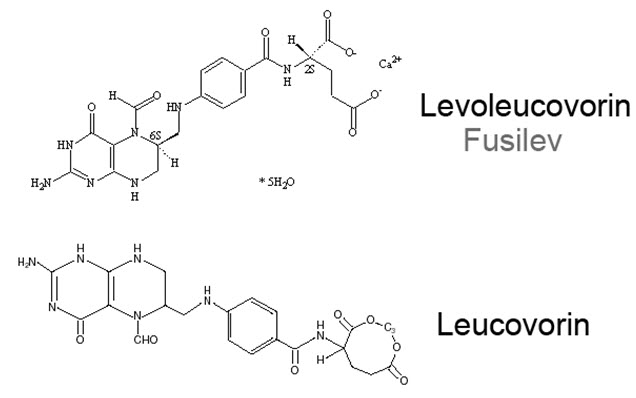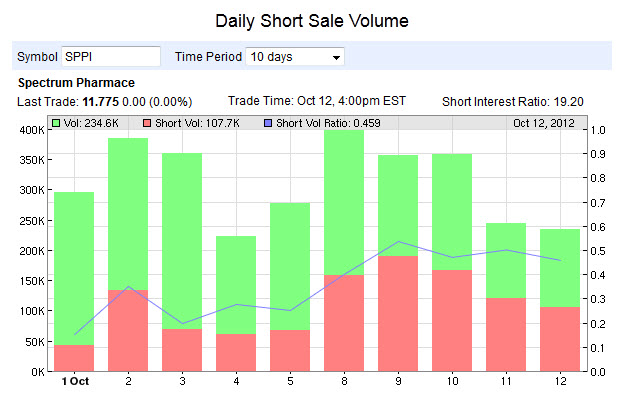After an organized retreat from its 52-week high of $17.48/share in early July 2012, Spectrum Pharmaceuticals (SPPI) has seen major selling pressure and a large build of short interest that was intensified on August 8, 2012 by a poorly received earnings report.
Despite a pretty decent revenue guidance of $300 million for Spectrum for the year of 2012 supported by admirable sales figures, investors stayed stubbornly uncertain (and hence bearish) on the future.
Since the start of September though, SPPI has begun to stabilize around $12/share. This implies that the momentum that had been building the company’s ridiculously high short interest (which is now about 54% of floated shares) is probably out of gas without any more catalysts that could drop SPPI even more. So, with almost 29 million of the company’s ~53 million shares ready to be bought back, what is stopping SPPI from a massive relief rally? Would a total reversal of momentum be enough to bring SPPI to a new 52-week high given the stock’s volatility?
There were a lot of factors that were pushing SPPI shares lower in the second half of summer, like untimely and significant-volume insider selling by CEO Rajesh Shrotriya as pointed out by Joe Springer, plus the short-term price action that signified a new potential downtrend on the chart following SSPI’s peak that got technical traders interested in the short side. Fundamentally detrimental factors weighed in on the confidence of long-term holders, like the near-failed acquisition of Allos Therapeutics (NASDAQ: ALTH) and the threatening arrival of generic competition for Spectrum’s best-selling product – Fusilev (levoleucovorin). Since Fusilev
To the relief of many, we finally saw the successful acquisition of Allos by Spectrum on September 6, 2012 for September 5th’s closing price on the NASDAQ of $1.82/share in cash. This was a ~$180 million buy for rights to the Peripheral T-Cell Lymphoma drug Folotyn that was approved by the FDA back in 2009, which is commonly used as a second-line treatment. Basically, this means that patients with peripheral T-cell lymphoma are still given chemotherapy first – in the event of a recurrence of PTCL, Fotolyn is used instead.
This newly acquired drug will be challenged by Celgene Corporation’s (NASDAQ: CELG) new sNDA-approved Istodax (Romidepsin) for second-line treatment of PTCL (in addition to its main target – CTCL). About dozen other compounds are currently aiming at the PTCL market too (with both first and second-line treatment in mind) which will directly hurt the earnings potential of Spectrum’s new acquisition.
We also have to address the elephant in the room, which is the Fusilev (aka levoleucovorin) situation. I can’t think of any other factor that would give that level of confidence to holders of 29 million shares short SPPI. Considering that Spectrum is actually very profitable, despite its status as a pharmaceutical company in the process of developing 11 separate compounds in clinical trials, the Fusilev scenario has to be very bleak for me to buy the bearish argument with everything else considered. Note that Spectrum is even rich enough to buy back its own shares (a very rare trait for smaller pharmaceutical companies) – how can Fusilev’s prospects be bad enough to bring the SPPI market cap to only $750 million?
To understand Fusilev, we have to first understand that it is more of a “utility” drug than a standard drug. For instance, it is used in conjunction with the “active” compound 5-fluorouracil (a common chemotherapy agent) in the treatment of metastatic colorectal cancer. It can also be used to inhibit the toxic effects of another drug called methotrexate, which is used for a variety of conditions (including psoriasis, arthritis, and certain cancers). The Fusilev problem isn’t derived from a lack of demand, but from a generic compound called “leucovorin” (observant readers will note that it’s got the same chemical name as Fusilev, minus the “levo”). Their structures are nearly identical too.
While Spectrum has managed to sell as much as $56.6 million worth of Fusilev last quarter (a nearly 40% increase in revenue relative to 2011), everyone is expecting the party to end at some point, because certain studies have shown that Fusilev/levoleucovorin has virtually identical efficacy and tolerability relative to leucovorin in cancer treatment. The potential “Fusilev-killer”, leucovorin, also happens to be on the FDA’s drug shortage list for 2012 which has certainly slowed down the market forces that would have hit Spectrum’s revenue this year. To compete more effectively, Spectrum has been cutting the price of Fusilev, but the bears are certain that Spectrum’s bubble is going to be popped in the near future.
Since Fusilev generates over 80% of Spectrum’s revenue, this is best described as a “shareholder’s nightmare waiting to happen”, and does give a lot of ammunition to bears for the medium-term. Fusilev’s revenue will probably be cut in half (or worse) when leucovorin is more widely available, and like other SPPI observers I don’t see enough sales potential from their non-Hodgkin’s lymphoma drug Zevalin to pick up the slack. I also don’t see all that much potential from the acquisition of Allos and their flagship drug Fotolyn, and figure that the company could have done better.
Returning to previous observations note that the sheer size of the company’s drug pipeline, the company’s ability to repurchase shares, and the huge short interest are pointing to a very undervalued stock too. There are certainly valid arguments on each side of SPPI, but the crowdedness of the bear side implies that SPPI is a bad short right now. If Spectrum is fairly valued, one would still expect short covering and share repurchases to put the bias on the upside. Trade accordingly.
- English (UK)
- English (India)
- English (Canada)
- English (Australia)
- English (South Africa)
- English (Philippines)
- English (Nigeria)
- Deutsch
- Español (España)
- Español (México)
- Français
- Italiano
- Nederlands
- Português (Portugal)
- Polski
- Português (Brasil)
- Русский
- Türkçe
- العربية
- Ελληνικά
- Svenska
- Suomi
- עברית
- 日本語
- 한국어
- 简体中文
- 繁體中文
- Bahasa Indonesia
- Bahasa Melayu
- ไทย
- Tiếng Việt
- हिंदी
Trading Spectrum Pharmaceuticals: Sizable Pipeline, Undervalued Stock
Published 10/16/2012, 04:12 AM
Updated 07/09/2023, 06:31 AM
Trading Spectrum Pharmaceuticals: Sizable Pipeline, Undervalued Stock
Latest comments
Loading next article…
Install Our App
Risk Disclosure: Trading in financial instruments and/or cryptocurrencies involves high risks including the risk of losing some, or all, of your investment amount, and may not be suitable for all investors. Prices of cryptocurrencies are extremely volatile and may be affected by external factors such as financial, regulatory or political events. Trading on margin increases the financial risks.
Before deciding to trade in financial instrument or cryptocurrencies you should be fully informed of the risks and costs associated with trading the financial markets, carefully consider your investment objectives, level of experience, and risk appetite, and seek professional advice where needed.
Fusion Media would like to remind you that the data contained in this website is not necessarily real-time nor accurate. The data and prices on the website are not necessarily provided by any market or exchange, but may be provided by market makers, and so prices may not be accurate and may differ from the actual price at any given market, meaning prices are indicative and not appropriate for trading purposes. Fusion Media and any provider of the data contained in this website will not accept liability for any loss or damage as a result of your trading, or your reliance on the information contained within this website.
It is prohibited to use, store, reproduce, display, modify, transmit or distribute the data contained in this website without the explicit prior written permission of Fusion Media and/or the data provider. All intellectual property rights are reserved by the providers and/or the exchange providing the data contained in this website.
Fusion Media may be compensated by the advertisers that appear on the website, based on your interaction with the advertisements or advertisers.
Before deciding to trade in financial instrument or cryptocurrencies you should be fully informed of the risks and costs associated with trading the financial markets, carefully consider your investment objectives, level of experience, and risk appetite, and seek professional advice where needed.
Fusion Media would like to remind you that the data contained in this website is not necessarily real-time nor accurate. The data and prices on the website are not necessarily provided by any market or exchange, but may be provided by market makers, and so prices may not be accurate and may differ from the actual price at any given market, meaning prices are indicative and not appropriate for trading purposes. Fusion Media and any provider of the data contained in this website will not accept liability for any loss or damage as a result of your trading, or your reliance on the information contained within this website.
It is prohibited to use, store, reproduce, display, modify, transmit or distribute the data contained in this website without the explicit prior written permission of Fusion Media and/or the data provider. All intellectual property rights are reserved by the providers and/or the exchange providing the data contained in this website.
Fusion Media may be compensated by the advertisers that appear on the website, based on your interaction with the advertisements or advertisers.
© 2007-2024 - Fusion Media Limited. All Rights Reserved.
